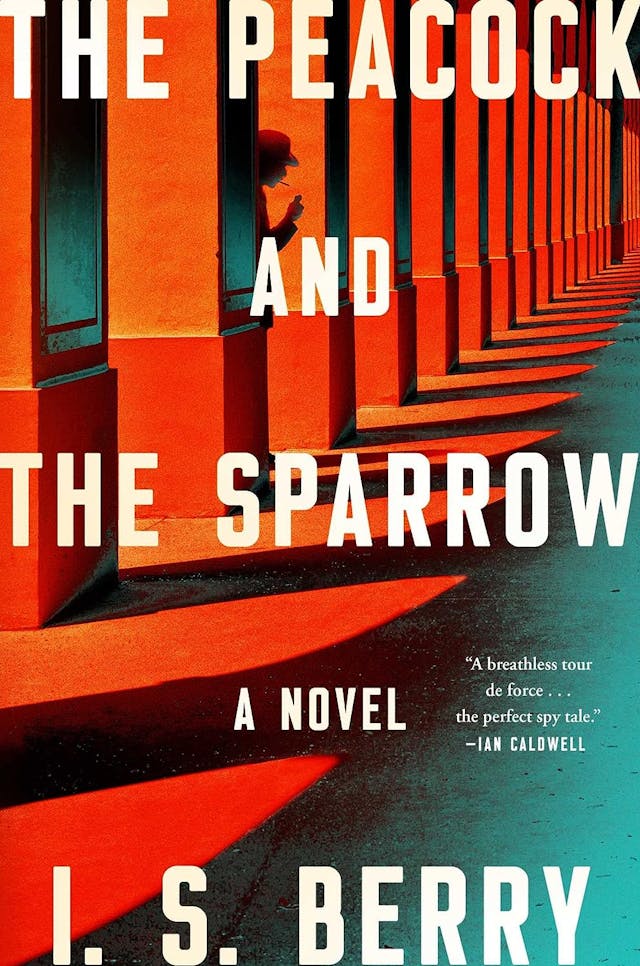Ilana Berry | April 2, 2024
The Prague Novel Edition
On post-communism, spying, and elusive inspiration.
Recommended Products

I.S. Berry's debut spy novel exploring themes of espionage, love, and revolution, drawing from the author's own experiences.
A late breaking WITI today, written by someone I am delighted to have with us. Be sure to buy her excellent book. -Colin (CJN)
I.S. Berry (ISB) spent six years as an operations officer for the CIA, serving in wartime Baghdad and elsewhere. Her debut spy novel, The Peacock and the Sparrow, was named a Best Book of the Year by The New Yorker and NPR, and has been nominated for an Edgar Award for Best First Novel. She’s a graduate of the University of Virginia School of Law and Haverford College.
Ilana here. Prague in the 1990s was a magical place. Communism had fallen, a seat at the opera cost a few bucks, the city’s magnificence had yet to be sullied by hordes of tourists or chain restaurants. Playwright and former dissident Václav Havel was at the helm, transforming and privatizing and chain-smoking. NATO had opened its arms. In 1994, President Clinton played saxophone at the Reduta black-light theater, where absinthe was served. Statues of Soviet dictators were vanishing. A promise of something was in the air, rising from the city like káva turk steam.
To outsiders, Prague was irresistible precisely for its halfway quality. The feeling that all you had to do was dust off a bit of grime to reveal majesty. That down every alley was something undiscovered, a café or rococo church, whose first arresting view you could claim as your own. The next great thing was just around the corner. You could be the next great thing.
It’s no wonder expats flocked to this new Left Bank in droves. Modern-day beatniks were eager to pan the fertile avant-garde soil; to get a hit of hedonism and a deprivation buzz; above all, to strike literary riches. If you didn’t have a manuscript in progress (or paint, play in a band, smoke, sip brightly colored cocktails into the night), you didn’t belong. Literary salons were de rigueur. The Globe bookstore was perpetually packed, its bulletin board a veritable collage of hopes and dreams.
Full confession: I was one of the droves. Fresh out of college in 1998, with all my worldly possessions in my suitcase, I headed to Prague on a one-way ticket to try my hand at becoming a writer. The great expat novel, I felt sure, was just waiting for my pen. From this city’s rough slab of clay, surely, like Rabbi Loew, I could bring my Golem to life.
It never happened.
Why is this Interesting?
Those of us who participated in the great migration now know that Prague in the nineties was notorious for having produced absolutely no notable works of expat literature. (Prague, published in 2003 by Arthur Phillips, is probably the closest approximation—but, despite the title, is actually set in Budapest.)
After less than a year, my infatuation with Prague ended. The bohemian culture was too bohemian. I wasn’t into drinking or drugs, or living in hovels and on leftovers. I wasn’t particularly anti-establishment or angst-ridden. Above all, no story had materialized.
So late one night, when the Cold-War-era radio phone in my Nerudova flat rang, I knew my answer before I’d picked up. Yes, I shouted into the clunky handset. I’d love to work as an intelligence analyst. The connection was bad, but the woman on the other end got the gist. Great, she said. We need someone with knowledge of transition countries. I’ll arrange to have your household goods shipped to England.
A few weeks later, I entered the American embassy on Trźište, just down the street from my flat, where a Foreign Service officer handed me my paperwork. I was headed to Cambridge, England to work as a Balkans intelligence analyst for the U.S. Department of Defense. The move would be easy: my worldly possessions barely filled a suitcase.
Nearly six years later, I would again pack my bags, this time with navigation beads, cargo pants, and a compass watch. I was headed to wartime Baghdad for my first assignment as a CIA spy. It would be a harrowing tour, filled with failure, danger, confusion, and heartbreak.
In 2012, I would return to the Middle East, spending two years in Bahrain during the Arab Spring—a movement also filled with disappointment and broken promises.
By the time I returned from Bahrain, my suitcase was finally full. I had a story to tell. Last year, my debut novel, The Peacock and the Sparrow, was published. It’s a tale of an aging spy stationed in the Persian Gulf who becomes embroiled in murder, consuming love, and a violent revolution. It’s about expats and their foibles, indulgences, and delusions. It’s the culmination of my years abroad. Two-and-a-half decades later, Prague had finally worked its magic.
Stories, I’ve learned, need more than time and place, more than physicality. They need substance, lived experience, depth. And sometimes you don’t find the story; it finds you. (ISB)
—
Thanks for reading,
Noah (NRB) & Colin (CJN) & Ilana (ISB)
—
Why is this interesting? is a daily email from Noah Brier & Colin Nagy (and friends!) about interesting things. If you’ve enjoyed this edition, please consider forwarding it to a friend. If you’re reading it for the first time, consider subscribing.
